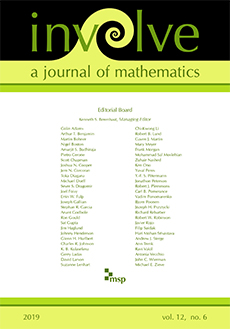Abstract
The number is defined to be the first integer such that it and every subsequent integer can be written as the sum of the -th powers of or more distinct positive integers. For example, it is known that , and thus the last number that cannot be written as the sum of one or more distinct squares is 128. We give a proof of a theorem that states if certain conditions are met, a number can be verified to be . We then use that theorem to find for and for .
Citation
Chris Fuller. David Prier. Karissa Vasconi. "New results on an anti-Waring problem." Involve 7 (2) 239 - 244, 2014. https://doi.org/10.2140/involve.2014.7.239
Information





